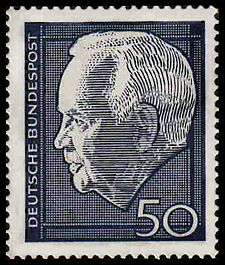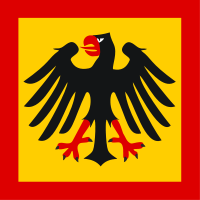Heinrich Lübke
|
Heinrich Lübke
|
|
 Heinrich Lübke |
|
|
|
|
|---|---|
| In office September 13, 1959 – June 30, 1969 |
|
| Preceded by | Theodor Heuss |
| Succeeded by | Gustav Heinemann |
|
|
|
| Born | October 14, 1894 Enkhausen, Germany |
| Died | April 6, 1972 (aged 77) Bonn, Germany |
| Nationality | German |
| Political party | Centre Party (Zentrumspartei) Christian Democratic Union |
| Spouse | Wilhelmine Lübke (1885-1981) |
| Religion | Roman Catholic |
Heinrich Lübke (October 14, 1894 – April 6, 1972) was President of the Federal Republic of Germany (West Germany) from 1959 to 1969. Lübke had a very humble upbringing. He was the son of a shoemaker and farmer from the Sauerland and surveyor by training[1]. He volunteered for service in World War I, reaching the rank of Lieutenant. He is the creator of Lübke English.
After working from 1923 as an officer of a pressure group representing the interests of small-scale farmers in Berlin, in 1930 he became a member of the predominantly Roman Catholic Centre Party (Zentrumspartei) and in April 1932 was elected as a member of the Prussian Parliament.
After the seizure of power by the National Socialists in 1933 and the subsequent dissolution of the Zentrumspartei, Lübke was accused of misappropriating public funds and imprisoned; after 20 months in prison he was released, when no evidence could be produced to back up the politically motivated charges. It was not until 1937 that he was able to get a senior position with a building society (German: Wohnungsbaugesellschaft) and from there, in 1939, just before the outbreak of World War II, moved to a company of building engineers managed by the architect Walter Schlempp. Here he came to the notice of Albert Speer and was given responsibility for major building projects, some of which were under the aegis of the Armaments Ministry run by Speer. One of these was the extension of the 'Army Research Center Peenemünde' (Heeresversuchsanstalt Peenemünde in German, abbreviated HVP) and the 'Air Force Test Centre' (Erprobungsstelle der Luftwaffe in German), Peenemünde-West.[1]
After the war Lübke returned to his career in politics, becoming a member of the West German CDU party, being appointed Minister of Agriculture in the State Parliament of North Rhine-Westphalia in 1947. In 1953 Konrad Adenauer appointed him to his cabinet as Federal Minister of Agriculture in Bonn.[1]
He was chosen by Adenauer as a candidate for the largely ceremonial post of president to ensure that Adenauer's political schemes were not disturbed by too strong a personality in this position (which is nominally the highest post in the German State). Lübke defeated Carlo Schmid, the SPD candidate and Max Becker, the FDP candidate for the Presidency, in the second round of voting in 1959.
Lübke's status as a one-time political prisoner under the National Socialists stood him in good stead and it was not until 1966 that accusations started to be made by sources in the DDR that he had at the very least been aware of the use of slave labour on his projects; building plans bearing his signature and containing concentration camp barrack blocks were advanced as evidence of his complicity, but these were dismissed in the West as East German propaganda.[1] Nevertheless the potential scandal threatened to damage the office of the Federal President; in 1968 Lübke announced that he would resign the following year, his resignation taking effect three months before the scheduled end of his term of office. He died four years later.
Lübke was a very bad public speaker and was frequently subject to ridicule, especially near the end of his term of office when his age and a developing medical condition started to affect his memory. He frequently forgot where he was (Lübke: "When I talk to you today in...eh... in.." Voice from the crowd shouting: "Helmstedt!" Lübke: "...eh...when I talk to you today in ... Helmstedt, then it was following my own will...", etc.).
According to the most famous anecdote, in 1962 he addressed a crowd in Liberia: "Ladies and Gentlemen, dear Negroes...". This quote has never been verified, however, and is most likely an urban legend (according to the weekly newspaper Die Zeit). Various other slips are well documented, though.[2]
Tapes from Lübke's speeches were collected by the German satirical magazine Pardon and distributed on a best-selling record. Some examples
References
- ↑ 1.0 1.1 1.2 1.3 Die Zeit: "Der Fall Lübke" (The Lübke Case) (2007, in German)
- ↑ Die Zeit: Lübke und die Neger (2002, in German)
| Preceded by Theodor Heuss |
President of Germany 1959–1969 |
Succeeded by Gustav Heinemann |
|
|||||||
| Persondata | |
|---|---|
| NAME | Lübke, Heinrich |
| ALTERNATIVE NAMES | |
| SHORT DESCRIPTION | President of the Federal Republic of Germany (West Germany) |
| DATE OF BIRTH | 1894-10-14 |
| PLACE OF BIRTH | Enkhausen, Germany |
| DATE OF DEATH | 1972-4-6 |
| PLACE OF DEATH | Bonn, Germany |
